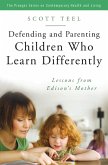Due to the extensive changes in family structure such as the increase of single parent families, a high divorce rate, and the decline of the extended family, support systems for young children are in decline. This decline disrupts the support systems' ability to shape children's prosocial values. Because of the fear of lawsuits and limited financial resources, community services and schools no longer provide the framework needed to balance changes in the contemporary family structure. This book provides insight into voids that have created social skills affecting this young population using an integrative approach to examine the casual factors of violent behavior in preteens. It offers suggestions for alleviating some of the causative factors that have created this nationwide problem. Changes in family structure, the role of the community, the educational philosophy of schools, and the juvenile justice system are discussed as examples of casual factors of violent behavior in preteens. This timely book uses an integrative approach to examine these factors as well as to discuss the changes in the juvenile justice system in terms of punishment, treatment, and rehabilitation. A direct response to current events such as the Columbine shooting and recent elementary school shootings, ^IChildren Who Murder^R will be of interest to practitioners, educators, guidance and educational counselors, lawyers, and parents.
Bitte wählen Sie Ihr Anliegen aus.
Rechnungen
Retourenschein anfordern
Bestellstatus
Storno









